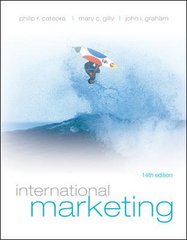Question
Consider the following principal-agent problem between a manager and a worker. The manager of a car dealership wants to sell cars. Each car is sold
Consider the following principal-agent problem between a manager and a worker. The manager of a car dealership wants to sell cars. Each car is sold at the price P=$1,000. The worker (salesperson) needs to put effort to try and sell the cars. If the worker chooses effort level e, then with probability Prob=50e she is able to sell 10 cars, and with probability Prob=1-50e she is only able to sell 5 cars.
It is costly for the worker to put effort trying to sell cars. For the worker, the effort cost is given by the function
C=62,500e2
The manager will pay the worker a bonus b for each car sold. The worker's expected utility equals her expected income minus her effort cost. The worker chooses the effort that maximizes her expected utility.
The car dealer's only cost is the bonus it pays the worker, and the revenue comes from the cars sold. The manager chooses the bonus that maximizes the firm's expected profit.
1) Find the best response function of the worker (note that your answer here should be a function, not a number). The best response function of the worker is ?
2) The manager will optimally offer a bonus b=? to the worker.
Step by Step Solution
There are 3 Steps involved in it
Step: 1

Get Instant Access to Expert-Tailored Solutions
See step-by-step solutions with expert insights and AI powered tools for academic success
Step: 2

Step: 3

Ace Your Homework with AI
Get the answers you need in no time with our AI-driven, step-by-step assistance
Get Started


